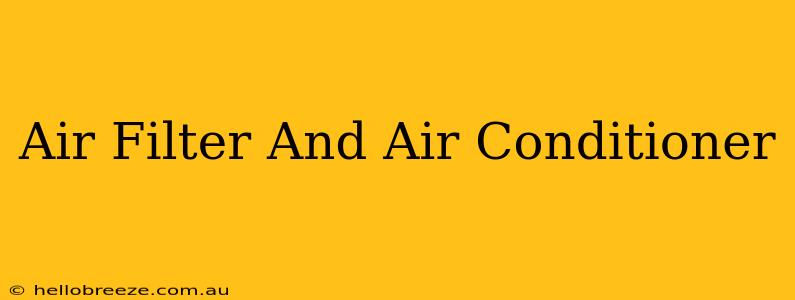Maintaining a comfortable and healthy indoor environment relies heavily on the interplay between your air conditioner and its air filter. These two components work together, but understanding their individual roles and how they impact each other is crucial for optimal performance and longevity. This comprehensive guide explores the vital connection between your air filter and air conditioner, offering practical tips for maximizing their efficiency and ensuring a clean, cool home.
The Crucial Role of the Air Filter
The air filter is the unsung hero of your air conditioning system. Its primary function is to trap dust, pollen, pet dander, and other airborne particles before they enter the air conditioner's internal components. Neglecting regular filter changes can lead to a cascade of problems, impacting both the performance and lifespan of your AC unit.
Why Regular Air Filter Changes Matter
- Improved Air Quality: A clean filter ensures that the air circulating through your home is cleaner and healthier, particularly beneficial for allergy sufferers and those with respiratory sensitivities.
- Increased Efficiency: A clogged filter restricts airflow, forcing your air conditioner to work harder to cool your space. This increased strain leads to higher energy bills and potentially premature wear and tear on the system.
- Enhanced System Lifespan: By preventing dust and debris from accumulating within the AC unit, regular filter changes extend the lifespan of your equipment, saving you money on costly repairs or replacements.
- Prevents Breakdowns: A severely clogged filter can restrict airflow to the point of causing the compressor to overheat and potentially fail, leading to expensive repairs.
How Often Should You Change Your Air Filter?
The frequency of air filter changes depends on several factors, including the type of filter, the number of occupants in your home, the presence of pets, and the level of outdoor pollution. However, a good rule of thumb is to check your air filter at least once a month and replace it every 1-3 months. If you notice significant dust accumulation or a noticeable decrease in airflow, it's time for a change.
The Air Conditioner: More Than Just Cool Air
Your air conditioner is a complex machine designed to remove heat and humidity from your home. While the air filter protects the internal components, the AC unit's efficient operation is crucial for maintaining a comfortable temperature.
How the Air Conditioner Works with the Air Filter
The air conditioner draws in air from your home, passing it through the filter to remove contaminants. The clean air then travels through the evaporator coil, where it's cooled by refrigerant. This cool air is then circulated throughout your home, while the warm air is expelled outside. A clean filter ensures this entire process runs smoothly and efficiently.
Signs Your Air Conditioner Needs Attention
- Weak Airflow: Noticeably weaker airflow from your vents is a strong indicator of a problem, often linked to a clogged filter or other internal issues.
- Increased Energy Bills: A spike in your electricity bill can signify that your AC unit is struggling, possibly due to a clogged filter or other underlying problems.
- Unusual Noises: Strange noises emanating from your air conditioner, like rattling or grinding, warrant immediate attention from a qualified technician.
- Inconsistent Cooling: If certain rooms are noticeably cooler or warmer than others, there could be a problem with your system's airflow or other components.
Maintaining a Healthy Partnership: Tips for Optimal Performance
Optimizing the performance of your air conditioner and air filter is crucial for comfort and efficiency. Here are some practical tips:
- Choose the Right Filter: Select an air filter with the appropriate MERV rating (Minimum Efficiency Reporting Value) for your needs. Higher MERV ratings indicate better particle filtration.
- Regular Inspections: Regularly inspect your air filter and replace it as needed.
- Professional Maintenance: Schedule annual professional maintenance for your air conditioner to ensure optimal performance and identify potential problems early.
- Clean Vents and Registers: Dust and debris accumulated in your vents can restrict airflow, impacting the efficiency of your system.
By understanding the symbiotic relationship between your air filter and air conditioner, and implementing these simple maintenance practices, you can ensure a clean, comfortable, and energy-efficient home environment for years to come. Remember, a small investment in maintenance can save you significantly in the long run.

